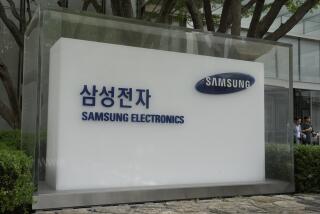First it was exploding Samsung phones. Now it’s exploding Samsung washing machines

According to a federal class-action lawsuit, Samsung top-loading washing machines have exploded.
One Georgia mom was pulling clothes from the dryer, with her 4-year-old son nearby, when she heard the boom and saw the damage. Another woman thought something had crashed through her roof. In one instance, metal shards flung into a hallway and ripped holes in the wall. Laundry rooms have flooded. A whole house shook.
The cause of this carnage, according to a federal class action lawsuit filed last month, is another exploding product made by Samsung Electronics Co.
Not smartphones, but washing machines.
It’s not the sort of explosion, as with the lithium ion batteries in phones, caused by chemical reactions. Some washing machines, the suit alleges, vibrate violently under heavy loads causing the tub to “become unfastened, resulting in a dramatic centrifugal explosion that destroys the machine and nearby property.”
The lawsuit alleges that Samsung has known of its exploding washing machine problem for years and did little to warn consumers. The plaintiffs — three women from Texas, Indiana and Georgia — demanded, among other things, the immediate release of a safety warning about the top-loading washing machines in question.
On Wednesday, more than a month after the lawsuit was filed, the U.S. Consumer Product Safety Commission issued a statement about “safety issues” with Samsung washers.
In a statement released on its website, the commission said it is “actively and cooperatively working with Samsung to address safety issues related to certain top-load washing machines made between March 2011 and April 2016.”
It did not specify which models are potentially dangerous, but the lawsuit alleged there were at least 11.
This warning comes just weeks after Samsung recalled its Galaxy Note 7 cellphone after the gadget began exploding in consumers’ pockets, vehicles and airplanes.
The news of another exploding Samsung product offered the Internet plenty of fodder.
One person tweeted, “I’ve got to be honest. I’m kind of into Samsung’s new EXPLODING design trend. It takes risks, it’s not afraid to think different.”
Samsung, for its part, declined to comment on pending litigation, according to CNN, but released a statement on its website addressing the Consumer Product Safety Commission warning.
As of right now, the commission and Samsung advise owners of the company’s top-loading washing machines to use lower speeds, such as the delicate cycle, when washing bedding, bulky clothes or water-resistant materials.
“There have been no reported incidents when using this cycle,” Samsung said in the statement.
Most of the exploding machine examples documented in the lawsuit — from the plaintiff’s experiences, news articles and complaints on the safety commission website SaferProducts.gov — occurred in 2015.
In its statement, Samsung called these incidents “rare” and said affected units “may experience abnormal vibrations that could pose a risk of personal injury or property damage.”
“It is important to note that Samsung customers have completed hundreds of millions of loads without incident since 2011,” the Samsung statement said.
The lawsuit, however, paints a far more dire picture.
Photos included in the filing show the tops blown entirely off the washing machines. Some lurched so violently, the lawsuit alleges, that the machines spun and jumped from their original positions. Holes were punched into dry wall, and nearby appliances were dented or scratched.
Melissa Thaxton, a plaintiff from Dallas, Ga., was standing next to her washing machine, unloading clothes from the dryer, when it exploded. Thaxton said it sounded as if “a bomb went off,” according to the lawsuit. Her 4-year-old son was playing nearby.
Complaints reported to SaferProducts.gov describe similarly jarring experiences.
One person wrote that the affected machine was washing a partial load when, during the spin cycle, it “broke free, throwing itself against walls and throwing parts and water everywhere. Had someone been nearby they could have been severely injured.”
Another woman said she heard a “violent sounding commotion” coming from the laundry room one night. She yelled for her husband and found her 2-month-old washing machine “lying on its side, the lid completely blown off, the sides of the machine expanded outward, the internal drums now thrown behind the machine on the floor, the machine itself thrown across the room, and shards of metal and plastic lying everywhere.” The floor was covered in water, according to the complaint, and the garage door was dented from the force of the exploding materials.
“Samsung knowingly, affirmatively and actively misrepresented and concealed the true character, quality and nature of the washing machines and sold the washing machines into the stream of commerce as if they were safe for use,” the lawsuit alleges.
It called on Samsung to take “corrective action” by, in addition to releasing a consumer warning, issuing a national recall, discontinuing the manufacture and distribution of the affected machines and informing the public of the pending class-action lawsuit.
The lawsuit also accuses Samsung of destroying evidence related to the defective washing machines.
In its statements Wednesday, Samsung and the Consumer Product Safety Commission said they are working on a “remedy” that will “help ensure that there are no further incidents,” but gave no further information.
The safety commission said additional incidents should be reported at SaferProducts.gov, and Samsung provided a link for consumers to check if their serial number matches the models deemed defective.
“Your safety is our top concern,” the company said.
Mettler writes for the Washington Post.
ALSO
Wells Fargo live updates: ‘Y’all were rotten,’ lawmaker tells CEO John Stumpf
This app fuels the illicit trade of dumplings and pork knuckles in Southern California
More to Read
Inside the business of entertainment
The Wide Shot brings you news, analysis and insights on everything from streaming wars to production — and what it all means for the future.
You may occasionally receive promotional content from the Los Angeles Times.










